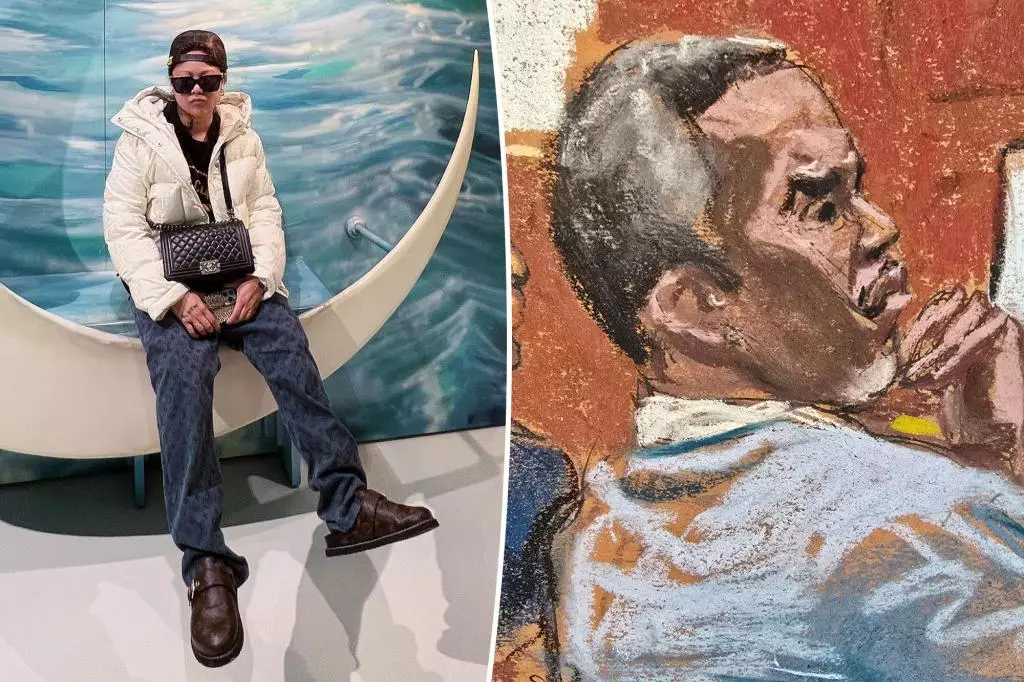In the glitzy world of celebrity culture, where fame often overshadows morality, shocking revelations about figures like Sean “Diddy” Combs illuminate a disquieting reality. The recent testimony by fashion designer Bryana “Bana” Bongolan sheds light on the grim complexities of power dynamics in Hollywood. Allegations of abuse and intimidation permeate this narrative, invoking a dissection of not only the celebrities involved but also the very framework of the entertainment industry’s insidious silence around such misconduct.
Bongolan’s harrowing account during her testimony in Manhattan’s federal court unveiled not only a personal trauma but also a systemic issue that begs for wider acknowledgment. Describing an encounter where Combs allegedly hung her precariously over the railing of a high-rise balcony, the details present a deeply unsettling image. The stark vulnerability inherent in her petite frame contrasted sharply with the imposing figure of Combs, raising questions about physicality and opposing forces in the realm of celebrity power plays.
Trauma’s Long Shadow
The aftermath of this traumatic incident is compounded by Bongolan’s accounts of persistent mental and emotional distress — “night terrors” and chronic paranoia. This testimony unearths the lingering scars that such experiences print onto victims. The psychological implications of physical intimidation extend far beyond the immediate event; they can redefine the identities and emotional landscapes of those who suffer. It is here that Bongolan not only demands justice but also highlights a critical obligation for society to comprehend the far-reaching impacts of such abuse.
Moreover, her claims resonate with a chorus of similar experiences shared by others who have crossed paths with Combs. The systemic pattern of intimidation and aggression suggests a narrative that extends past isolated incidents, fostering an environment that normalizes such behavior. This behavior echoes other accounts of celebrity violence and coercion, calling into question the ethical responsibilities of the industry and its bystanders.
The Dual Edge of Fame
While Combs fervently denies the allegations against him, asserting his innocence and claiming faith in the judicial process, this case emphasizes the ever-present dichotomy of fame. It serves to illustrate a world where the powerful can often wield their influence to dismiss, deflect, or even dismantle the narratives of those affected by their actions. Bongolan’s pursuit of justice becomes more than a fight for personal vindication; it stands as a beacon of hope for other victims languishing in silence, chained by fear and intimidation.
The testimonies from other witnesses, including Casandra “Cassie” Ventura, corroborate Bongolan’s experiences, weaving a more extensive tapestry of abuse that spans personal and professional realms. Ventura’s own allegations of physical violence provide a multi-dimensional view of Combs’ purported actions, revealing that such behaviors may not merely be byproducts of isolated incidents but rather indicative of a pattern ingrained within certain celebrity interactions.
The Culture of Silence
This trial is also a significant reminder of the culture of silence that often envelops allegations of abuse in the entertainment industry. The testimonies expose a web of complicity that not only allows abusive behaviors to flourish unchecked but also actively discourages victims from coming forward. Bongolan’s dilemma is emblematic of many who have felt the pressure to live in the shadows of their abuser, fearing retribution or further victimization.
As the legal proceedings unfold, the narrative encapsulates a crucial turning point not just for the individuals involved, but for the community at large. It presents an opportunity for meaningful dialogue around consent, power structures, and the necessity to dismantle the environment that enables such predatory behaviors to persist without challenge. This is not merely a courtroom battle; it is part of a larger movement striving for accountability in a culture that often prioritizes fame over integrity.
Bongolan’s prosecutions of her traumatic past resonate at a societal level, igniting discussions that demand a re-examination of how we perceive and respond to celebrity behavior. Through her courage, a pathway emerges for change — both legally and culturally — that could ultimately redefine boundaries within the complex arena of fame and power.

